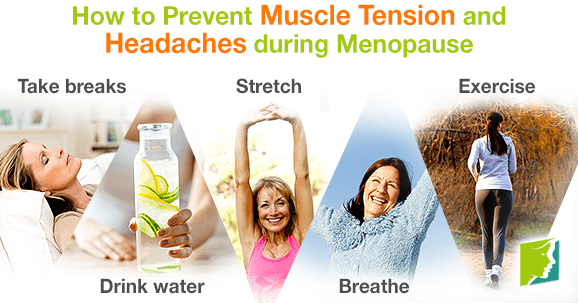Headaches afflict nearly 45 million Americans every day, and women are five times more likely to experience headaches than men. Women become more susceptible to headaches during menopause because of the hormone fluctuations experienced during this time. When hormone levels fluctuate, it results in intense pain due to the constant expanding and contracting of blood vessels in the scalp. Muscle tension that builds up in the neck, shoulders, and back can be very painful and also lead to headaches. Keep reading to learn how to prevent muscle tension and headaches during menopause.
Causes
Women are more susceptible to headaches when going through the menopause transition due to the aforementioned hormone fluctuations. There are other causes of muscle tension and menopausal headaches. These triggers include poor posture, insufficient sleep, dehydration, skipped meals, stress, and inactivity for long periods of time.
Prevention Methods
These tips can help relieve headaches and tension in the moment and also prevent future instances.
Take breaks
Every hour or two, take a five minute break to close your eyes and give them a rest. This is especially helpful if you read a lot or work in front of a computer all day. This can help prevent headaches and eyestrain. If you can, take a short nap (around 20 minutes), it can help you recharge and prevent afternoon headaches.
Drink water
Dehydration is a common cause of headaches, so it is important to drink plenty of water throughout the day, as well as avoid excessive amounts of alcohol and caffeine.
Stretch
Remembering to stretch your neck, shoulder, and back muscles several times a day can help relieve muscle tension and prevent headaches. Slowly rotate your head and gently bend your neck so that your head falls forward.
Breathe
Practicing breathing exercises throughout the day can help you relax and reduce stress and muscle tension, thus preventing headaches. Also, giving yourself a massage or getting a professional massage can be valuable for reducing tension and stress. A professional massage can be a little pricey, but a good massage is worth the splurge - and it is important to treat yourself on occasion.
Exercise
Getting at least 30 minutes of aerobic activity every day is highly beneficial for relieving tension and preventing headaches. Exercising releases “feel-good” neurotransmitters in the brain and significantly boosts energy levels, reduces stress, and improves mood. Walking, cycling, and swimming are all good forms of low-impact workouts that can help reduce stress and prevent headaches.
Muscle tension and headaches are bothersome and painful symptoms that become more frequent during menopause. It is important to be aware of the common causes of these symptoms, as well as helpful ways to prevent them such as using alternatives hot and cold compresses on shoulders and neck to relieve tension and possible headaches.
Sources
- National Health Service UK. (2013). Hormone Headaches. Retrieved November 11, 2014, from http://www.nhs.uk/livewell/headaches/pages/hormonalheadaches.aspx
- University Health Services: University of Berkeley. (n.d.). Preventing Headaches & Muscle Tension. Retrieved November 11, 2014, from http://uhs.berkeley.edu/home/news/pdf/headaches.pdf


